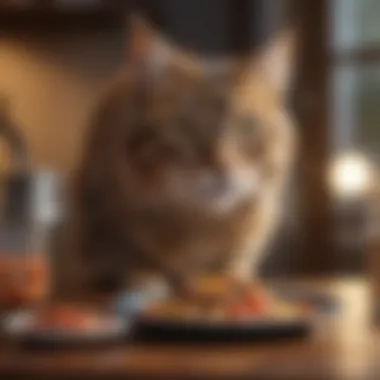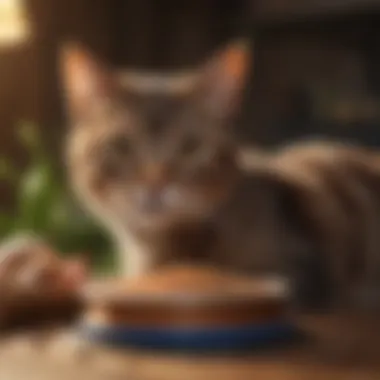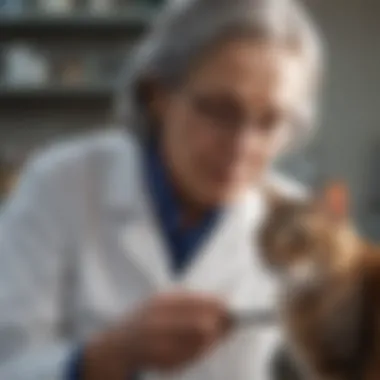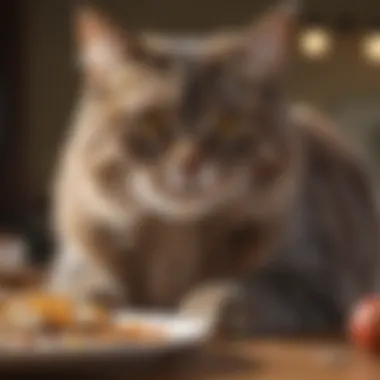Nutritional Considerations for Geriatric Cats: Choosing the Right Food


Intro
As cats age, their nutritional requirements undergo significant shifts. Understanding these changes is crucial for pet owners dedicated to providing the best care for their geriatric felines. Aging cats may experience various health issues, including dental problems, decreased mobility, and changes in metabolism. As such, their diet plays a pivotal role in managing their overall health. C by selecting appropriate food products formulated for older cats, owners can promote better health and enhance their cats' quality of life.
In this article, we will delve into the unique dietary needs of geriatric cats. We will examine key ingredients, nutritional profiles, and how to choose high-quality cat food. Additionally, it is essential to explore the health considerations that come into play, particularly the common ailments in senior cats and the practicalities of transitioning to a geriatric diet.
As we progress, we will also discuss how to interpret food labels and the importance of veterinary guidance in ensuring balanced nutrition. This guide serves as a comprehensive resource for pet owners who wish to make informed choices concerning their aging companions.
Pet Care and Grooming
Importance of Regular Care
Regular care for geriatric cats is essential not just for their comfort, but also for monitoring health changes. Routine check-ups can uncover underlying conditions such as kidney disease or arthritis, which may not be evident without a thorough examination. Regular veterinary visits help ensure that any dietary changes align with the cat's evolving health needs.
Grooming Techniques by Pet Type
Grooming becomes even more critical as cats age. Many older cats may struggle to groom themselves effectively, leading to matted fur and skin issues. Long-haired breeds, such as Maine Coons or Persians, may particularly require regular brushing to prevent fur tangles. Short-haired breeds also benefit from brushing to reduce shedding and hairballs.
Tools and Products Recommendations
Investing in high-quality grooming tools is vital for maintaining the comfort of geriatric cats. Recommended products include:
- Soft-bristle brushes: These are gentle on the skin, especially for sensitive older cats.
- De-shedding tools: Useful for reducing excessive shedding.
- Nail clippers: Easy-to-use clippers that prevent overgrown nails, which can be painful and lead to injury.
Seasonal Care Tips
Seasonal changes can affect geriatric cats differently. During warmer months, hydration is essential to prevent heat stress. Providing fresh water and maintaining a cool environment is critical. In winter, older cats may feel chilly; a cozy bed or blanket can provide the necessary warmth to keep them comfortable.
Health and Nutrition
Understanding Pet Nutrition
Understanding the essence of pet nutrition is fundamental for caregivers. Cats primarily require a diet rich in proteins, as well as certain fats, vitamins, and minerals. Older cats' diets should include easily digestible proteins and be low in carbohydrates to accommodate their aging metabolic systems.
Common Health Issues by Species
Geriatric cats often face health challenges that can be addressed through diet. Common conditions include:
- Kidney disease: Often related to aging, necessitating a diet lower in protein yet high in quality.
- Dental disease: Can affect a cat's ability to eat, requiring softer food options.
- Obesity: Weight management is crucial for cats who may be less active.
Preventive Care and Regular Check-Ups
Regular veterinary check-ups are crucial for geriatric cats. These appointments should include comprehensive health evaluations and blood work to detect problems early. Timely interventions can significantly affect the quality of life.
Food and Dietary Advice
When selecting food for aging cats, consider:
- Wet food: Beneficial for hydration and easy chewing.
- High protein content: Supporting muscle health.
- Healthy fats like Omega-3: Beneficial for joint health.
It is wise for pet owners to review ingredients and consult veterinarians when transitioning diets.
Dietary choices can significantly influence the well-being of geriatic cats.
Resources and Community Engagement
Recommended Books and Websites
For further learning about feline nutrition, some resources to consider include:
- **
Understanding Geriatric Cats
Understanding geriatric cats is crucial as they have specific needs differing from younger felines. As cats age, their bodies and behaviors undergo significant changes. Recognizing these changes can aid in providing appropriate care and nutrition, contributing to their overall well-being. This knowledge helps pet owners select the right food, manage health issues, and enhance the quality of life for their aging companions.
Defining Geriatric Age in Cats
The term geriatric typically refers to cats over the age of seven. However, some consider cats around ten years old to be seniors. Determining the exact age depends on various factors, including breed and health status. As cats age, their metabolic rate decreases, and they may not require as many calories as younger cats. Understanding geriatric age helps owners recognize the need for dietary adjustments and regular veterinary check-ups.


Common Changes in Senior Cats
As cats grow older, they experience various changes that can impact their nutrition and healthcare. It is important to be aware of these changes to provide the best possible care.
Physical Changes
Physical changes in senior cats include reduced muscle mass and joint stiffness. Cats may become less active as they age, leading to weight gain. Reduced activity and changes in body composition can affect their nutritional requirements. Providing the right nutrients can help maintain their health. Higher protein levels in food support muscle maintenance, while controlled fat levels help manage weight.
Behavioral Changes
Behavioral changes are also common in senior cats. They may become more reclusive or show less interest in play. Some can develop anxiety or stress, particularly with changes in their environment. A more predictable routine and understanding of their needs can help alleviate stress. Dietary changes may also affect behavior. Some cats require softer food as dental health declines, which can affect their eating habits.
Cognitive Changes
Cognitive changes can occur in older cats, resembling dementia in humans. Symptoms may include disorientation or changes in sleep patterns. Awareness of these changes is vital for pet owners. Providing a calm environment and mental stimulation can help manage these symptoms. Nutrition plays a role too; certain diets are formulated to support cognitive health, making it essential to choose food that meets the specific needs of geriatric cats.
Regular veterinary check-ups can help identify health issues that may arise due to aging, ensuring early intervention and care decisions.
Understanding the unique needs of geriatric cats is a step towards ensuring a long, healthy life. Recognizing the signs of aging aids in making informed dietary choices, promoting better health and happiness for senior felines.
Nutritional Needs of Older Cats
Understanding the nutritional needs of older cats is essential for maintaining their health and quality of life as they age. As cats move into their senior years, their bodies undergo various changes that can affect their dietary requirements. Selecting the appropriate food can greatly influence their overall well-being. In this section, we will explore the essential nutrients needed for senior cats and how aging impacts their digestion and metabolism.
Essential Nutrients for Senior Cats
The nutritional profile of senior cats is unique and requires specific consideration. Let's delve into the key nutrients that play a critical role in maintaining health and vitality in older cats.
Proteins
Proteins are vital for numerous bodily functions, including muscle maintenance and immune support. As cats age, they often lose muscle mass, making it important to ensure a sufficient intake of high-quality proteins.
Key Characteristic: Proteins help repair tissues and create enzymes.
Benefits: Providing a diet rich in proteins can help counteract muscle loss and support a healthy immune system in geriatric cats.
Unique Feature: Not all proteins are created equal. Animal-based proteins are usually more digestible than plant proteins.
Advantages: High-quality protein sources assist in preserving muscle mass as cats age. However, choosing the wrong protein source may lead to digestive issues if not properly balanced.
Fats
Fats provide essential fatty acids that contribute significantly to energy levels and skin health. For senior cats, the right balance of fats is crucial to ensure energy without excessive weight gain.
Key Characteristic: Healthy fats are concentrated sources of energy.
Benefits: They improve the coat’s condition and help in maintaining healthy skin, which can be important as older cats may be more prone to skin issues.
Unique Feature: Omega-3 and Omega-6 fatty acids are particularly beneficial for reducing inflammation and ensuring joint health.
Advantages: While fats are essential, it's important to balance fat intake to avoid obesity, which can complicate health issues in senior cats.
Carbohydrates
Carbohydrates can serve as a source of energy, particularly for cats that may not be very active. However, their role in a senior cat's diet is often debated.
Key Characteristic: They provide energy but do not carry the essential nutrients found in proteins and fats.
Benefits: A limited intake of carbohydrates can help maintain felines at a healthy weight.
Unique Feature: Some low-carbohydrate diets can help manage diabetes or obesity.
Advantages: While some carbohydrates can be beneficial, excess could contribute to weight gain, particularly if senior cats are less active.
Vitamins and Minerals
Vitamins and minerals are essential for general health and wellness in geriatric cats. They support metabolic functions and immune responses, among other vital processes.
Key Characteristic: They play diverse roles in maintaining cellular functions and preventing deficiencies.
Benefits: A balanced intake can help prevent common health issues, such as osteoporosis or heart disease in aging cats.


Unique Feature: Certain vitamins, like Omega-3 fatty acids, can also provide anti-inflammatory effects that benefit older cats’ mobility.
Advantages: Sufficient vitamins and minerals ensure comprehensive health support. However, not all foods have optimal levels, so careful selection of cat food is necessary to meet these nutritional demands.
Impact of Aging on Digestion and Metabolism
As cats grow older, their digestive systems may not function as effectively as before. Changes in gut health can lead to nutrient absorption issues. Metabolism also tends to slow, possibly affecting energy needs and weight management.
- Decreased Digestive Efficiency: Older cats can experience slower digestion, making it crucial to provide easily digestible food.
- Metabolic Changes: The energy needs of senior cats will often decrease. So, choosing food with lower calories but essential nutrients can help.
- Hydration Needs: Older cats may not drink enough water, increasing the need for wet food options.
Monitoring and adjusting dietary intake according to these changes can significantly impact their health and quality of life. Regular consultations with a vet can help tailor a geriatric diet effectively.
Choosing the Right Cat Food
Selecting appropriate food for geriatric cats is crucial. A proper diet directly influences their overall health and quality of life. Older cats have unique nutritional needs. They require specific formulations that cater to their age-related health conditions. Making the right food choice ensures that they receive essential nutrients while managing issues like obesity or kidney disease.
Formulated vs.
Generic Brands
Formulated brands often have specific nutritional profiles designed for senior cats. These brands focus on high-quality ingredients, addressing health considerations in older felines. Generic brands may lack such specialized formulations. It is important to consider if the food meets AAFCO standards, ensuring it provides optimal nutrition. This factor can significantly impact your cat's health and longevity.
Recognizing Quality Ingredients
Quality of ingredients is vital when choosing cat food. Look for real meat as the primary component. Avoid fillers like corn or soy, as they do not offer much nutritional value. Additionally, specific supplements may help, such as omega fatty acids or taurine. Recognizing these key ingredients will allow you to make informed decisions. Food that contains whole foods and natural components tends to be more beneficial for aging cats.
Reading Nutrition Labels
Reading nutrition labels can be daunting but is necessary. First, understand guaranteed analysis, where you'll find information on protein, fat, and moisture levels. Then examine ingredients list; it should show high-quality proteins at the top. Nutritional adequacy statement also helps determine if the food suits senior cats. Clear comprehension of these aspects ensures you select food aligned with your cat's needs and avoids potential health risks.
Wet Food vs.
Dry Food
Benefits of Wet Food
Wet food offers various advantages for geriatric cats. One of the main benefits is its high moisture content. Many older cats face hydration issues; the additional water in wet food aids in maintaining hydration. It also tends to be softer, making it easier for cats with dental problems. The palatable nature of wet food can encourage eating in cats that may be picky due to age.
Benefits of Dry Food
Dry food, on the other hand, provides several benefits as well. Its texture assists in dental health, helping to reduce plaque buildup. Many dry formulas also include added fiber, aiding in digestion. Additionally, dry food is often more convenient for owners. It is easy to store and can be left out without spoilage. Nonetheless, be mindful of water intake when feeding dry food to ensure adequate hydration for your geriatric cat.
Health Considerations for Geriatric Cats
Understanding the health considerations for geriatric cats is crucial for any cat owner. As cats age, they are prone to various health issues that can significantly impact their quality of life. Proper nutrition and dietary adjustments can help manage these issues effectively. Addressing common health challenges can guide owners in choosing suitable food, leading to improved well-being for their pets.
Common Health Issues
Kidney Disease
Kidney disease is prevalent among aging cats. This condition often results from the kidneys' declining ability to filter waste products from the blood. As the waste builds up, cats may experience symptoms like increased thirst, frequent urination, and weight loss. Kidney disease is a significant factor in dietary decisions, as specialized diets with lower protein levels and restricted phosphorus can aid in managing this condition.
The critical characteristic of kidney disease is its progressive nature. Early detection can help slow the progression, making dietary management essential. Such diets can promote better kidney function and enhance the cat's overall quality of life, providing a clearer path for better health outcomes.
Obesity
Obesity in geriatric cats is another serious concern. It is often a byproduct of sedentary lifestyles and excess calorie intake. Overweight cats face numerous health risks, including diabetes, heart disease, and joint problems. Addressing obesity necessitates dietary adjustments and a focus on portion control. A weight loss diet that is high in fiber but low in calories may help manage this condition.
The key characteristic of obesity is its preventability. Owners can make informed choices about portion sizes and food quality to avoid this issue. Implementing gradual dietary changes can help reverse obesity trends, supporting healthier weight management for geriatric cats.
Dental Problems
Dental health can decline as cats age, leading to dental disease and other complications. Issues like periodontal disease can cause pain, affecting eating habits and appetite. Additionally, bacteria from the mouth can enter the bloodstream, potentially harming vital organs.
A notable feature of dental problems is their link to overall health. Providing the right diet can help prevent dental disease. Accordingly, foods designed to reduce plaque and promote dental health are valuable. Attention to dental care is essential in maintaining a geriatric cat’s overall health.
Hyperthyroidism
Hyperthyroidism is another common endocrine disorder in senior cats. It occurs due to an overproduction of thyroid hormones, leading to symptoms such as increased appetite, weight loss, and hyperactivity. Diagnosis requires veterinary evaluation and may serve as a prompt for dietary review since certain diets can help manage symptoms.
A prominent aspect of hyperthyroidism is its impact on metabolism. Managed through specialized diets that are low in iodine, it can stabilize hormone levels. This dietary adjustment holds significant advantages in regulating health.


Dietary Adjustments for Health Conditions
When managing health issues in geriatric cats, dietary adjustments are essential. Tailoring nutrition based on specific health needs can contribute to a better quality of life. Various foods are available for common health conditions. Consulting a veterinarian can lead to a tailored dietary plan that considers the cat’s specific needs. Always monitor the cat’s response to dietary changes to ensure the best outcomes.
Practical Feeding Tips
Feeding geriatric cats is not just about filling their bowl. It involves a careful approach to their unique nutritional needs and preferences. Practical feeding tips can significantly enhance the overall health and well-being of senior felines. Tailoring meal times, food types, and feeding habits can ensure that aging cats receive the best care possible. Here are some valuable strategies.
Transitioning to Senior Cat Food
Gradual Transition
A gradual transition to senior cat food is essential for minimizing digestive upset and ensuring acceptance. This approach involves slowly incorporating the new food into the cat's diet over a period of about 7-10 days. Begin by mixing a small amount of the new food with the current food, gradually increasing the proportion of the new food each day.
Key characteristic: This slow integration allows time for the cat’s digestive system to adjust.
Beneficial choice: A gradual transition is popular because it helps reduce the risk of gastrointestinal issues, which senior cats are already more susceptible to.
Unique feature: This method is particularly advantageous because it respects the cat's eating habits and preferences, allowing for a smoother change. Adopting this practice can lead to better eating habits and a more positive experience for both the cat and the owner.
Monitoring Acceptance
Close monitoring of how a cat responds to new food is crucial. Owners should observe their cat’s eating habits and reactions once the transition begins. This step helps identify if there are any issues with taste or texture that could create problems.
Key characteristic: Monitoring acceptance allows for quick adjustments in the diet if needed.
Beneficial choice: This practice is favorable because it can prevent potential health issues that might arise if the cat does not adapt well to the new food. An attentive owner can spot early signs of rejection.
Unique feature: Regular observation enables pet owners to gauge their cat’s overall enthusiasm for feeding, ensuring that they stay engaged with their meals. Adequate monitoring can enhance the cat's overall dietary satisfaction, making it a vital component of the feeding process.
Meal Frequency and Portion Control
Geriatric cats often require a different frequency and portion size in their meals than younger cats. As they age, metabolism slows down, and their caloric needs may decrease.
- Meal Frequency: Instead of one or two large meals, offering smaller, more frequent meals can aid digestion and prevent obesity.
- Portion Control: Portion sizes should be adjusted based on the cat’s weight and activity level, preventing overeating and ensuring a balanced diet.
- Hydration: Always ensure that fresh water is available, as hydration is essential for senior cats, especially if they are on a dry food diet.
By incorporating these practical feeding tips, pet owners can significantly enhance the quality of life for their aging cats. Each step taken in this process not only addresses immediate nutritional needs but also promotes long-term health and contentment.
Veterinary Guidance
Veterinary guidance plays a critical role in the nutritional management of geriatric cats. As cats age, their health needs change significantly. It is essential for pet owners to understand the importance of seeking professional advice. Regular consultations with a veterinarian help identify any underlying health concerns early. This proactive approach aids in preventing more severe issues down the line.
Veterinarians can provide tailored recommendations on diet specific to your cat's health status, weight, and lifestyle. They can assist in selecting high-quality cat food that meets the unique nutritional needs of aging felines. This guidance is of great value, as not all cat foods are created equal.
Moreover, a veterinarian's insights into the right balance of proteins, fats, vitamins, and minerals will help ensure that geriatric cats receive proper nutrition. Understanding how age affects metabolism and digestion is vital as well. This knowledge informs the decisions pet owners must make about dietary changes and potential feeding schedules.
Importance of Regular Check-Ups
Regular veterinary check-ups are essential for monitoring the overall health of geriatric cats. These visits allow for the early detection of common age-related conditions like kidney disease or obesity. During these check-ups, veterinarians can assess changes in the cat’s body condition, dental health, and weight.
Keeping up with check-ups can prevent minor problems from escalating into major health issues.
Additionally, these appointments give pet owners a chance to discuss nutrition adjustments. Whether your cat needs to lose weight, gain muscle, or simply requires a more palatable diet, your veterinarian can provide actionable plans. This consistent monitoring can contribute to a better quality of life for senior cats.
Tailoring Diets with Professional Help
Every geriatric cat is unique, and their dietary requirements should be approached with care. Tailoring diets with professional help involves customizing food types and portions based on individual health needs. A veterinarian can run tests to assess specific health markers and provide dietary recommendations based on those results.
Some cats may require special diets. For instance, cats with kidney issues often benefit from lower protein levels, while those with diabetes need a different balance of nutrients. A veterinarian's expertise ensures that dietary choices align with the cat's specific health conditions.
By involving a veterinarian in the dietary planning process, pet owners can feel confident that they are providing the best possible care for their aging feline companions. This approach ultimately culminates in improved health, vitality, and a more comfortable life.
Finale
In this article, we have delved into the intricate nutritional needs specific to geriatric cats. Understanding the dietary requirements of older cats is critical for any pet owner. As cats age, their bodies undergo various changes that can affect their nutritional uptake. It is essential to recognize these shifts and how they impact food choices.
Selecting the right food is not merely a matter of preference; it has long-term effects on a cat's health and quality of life. Key points from this discussion underscore the importance of considering the nutritional profile of cat foods, recognizing high-quality ingredients, and understanding the implications of medical conditions on diet.
Veterinary guidance plays a crucial role in tailoring diets to suit the individual needs of your aging cat. Regular check-ups ensure that any issues are addressed promptly and that the diet remains as beneficial as possible as your pet ages. Transitioning to suitable food can be a delicate process, but when done properly, it can lead to significant improvements in energy levels and overall health for geriatric felines.
Remember that proper nutrition not only supports the physical health of senior cats but also contributes to their mental well-being.
In summary, being proactive about your geriatric cat's diet is crucial. The right food can help manage health issues, enhance longevity, and improve the quality of life. This comprehensive understanding equips pet owners with the tools they need to make informed choices for their beloved companions.
Summarizing Key Takeaways
- Geriatric cats have unique nutritional needs due to aging.
- Choosing high-quality, age-appropriate cat food can impact overall health and well-being.
- It's important to consider essential nutrients like proteins, fats, and vitamins when selecting food.
- Regular veterinary consultation is key to ensuring that dietary choices are tailored to individual health needs.
- Transitioning to new food should be gradual and monitored closely.
- The right diet can significantly enhance both physical and cognitive health in senior cats.















